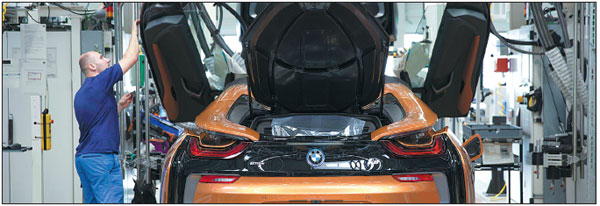Early start gives carmaker a leading role in innovating electrified segment
BMW is bullish about its electro-mobility drive, expecting strong double-digit growth in electrified cars in 2018, having consolidated its leading position in the segment with more than 100,000 such vehicles delivered last year.
The 65.6 percent surge in sales of electrified cars in 2017 brought the total number that bear the BMW and MINI marques to exceed 200,000 so far, according to the company.
"Selling 100,000 electrified cars in one year is an important milestone, but this is just the beginning for us," said Harald Krueger, chairman of BMW AG.
A breakdown of the company's 2017 sales shows that the BMW i3 saw sales grow by around 23 percent to 31,482 worldwide.
The plug-in hybrid BMW iPerformance vehicles also continued to grow in popularity, with sales almost doubling to total 63,605.
The MINI Countryman plug-in hybrid, which launched in 2017, saw 5,799 deliveries to customers around the world.
With its confidence further bolstered by this impressive performance, BMW has set a goal to put at least half a million electrified vehicles on the road by the end of 2019 and plans to further enrich its offerings.
"By 2025, we will offer 25 electrified models to our customers. Our early focus on electro-mobility has made this success possible - and electro-mobility will continue to be my measure for our future success," Krueger said.
He said electro-mobility is an essential element of BMW's NUMBER ONE>NEXT corporate strategy, which continues to expand its position as the leading provider of individual premium mobility and mobility services.
From 2021, the company's fifth generation of electric drivetrain and battery technology will adopt scalable, modular electrification kits that will allow all model series to be fitted with every type of drivetrain.
For its BMW i electric brand, which was founded in 2011, the company has already secured the naming rights from BMW i1 to i9, as well as from BMW iX1 to iX9. This year the carmaker will launch the BMW i8 Roadster, followed in 2019 by a fully electric MINI, in 2020 by the electric BMW X3 and in 2021 by the brand's new technology flagship, the BMW iNext, which will combine electro-mobility with autonomous driving and connectivity options for the first time in a series-production model.
BMW is one of the first premium carmakers to introduce electro-mobility. It launched project i, the trailblazer for BMW i, back in 2007.
Thanks to its early start, the company has gained a clear lead over its competitors when it comes to registrations of new fully-electric and plug-in hybrid vehicles in Europe, according to an independent POLK/IHS report.
The report said that BMW has a 21 percent market share in the segment, more than three times its share of the market for traditional models.
While electrified vehicles now account for two percent of new vehicles sold across all manufacturers in Europe, BMW has already boosted its proportion to 6 percent. The company's position is similarly strong when it comes to the worldwide market - the company has a 10 percent share of the global electrified vehicle market by the end of 2017. It said electrified models are in especially high demand in the Western European and the United States markets, for example, where they account for 7 percent of total BMW brand sales in both markets.
|
A worker checks a BMW i8 Roadster model on the production line. |
(China Daily 04/25/2018 page6)















